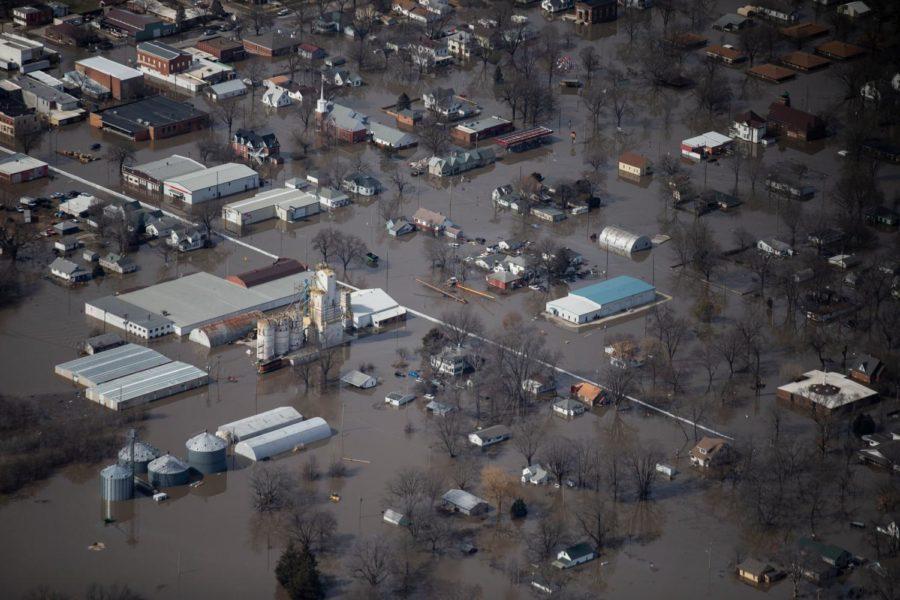Disaster relief fund applications now open to the Midwest
Two thirds of the city of Hamburg is underwater from flooding on the Missouri River on Monday, March 18, 2019, on the western edge of Iowa.
March 27, 2019
The flooding disaster in the Midwest has been making headlines for weeks as Iowa and other states have been hit with some of the worst flooding they have ever seen.
The Office of the Governor released information Sunday in order to assist Iowans with the daunting impacts of the recent flooding.
Iowa’s Individual Assistance Grant Program allows for $5,000 to be granted to families with income levels maxing at 200 percent of the federal property level, or a combined total annual income of $41,560 for a family of three.
The residents of 56 Iowa counties were included in a Presidential Disaster Declaration. This allows citizens to apply for flood assistance by reaching out through phone or online channels.
The full list of counties include: Adair, Allamakee, Audubon, Boone, Bremer, Buena Vista, Butler, Calhoun, Carroll, Cass, Cherokee, Clay, Crawford, Dallas, Decatur, Dickinson, Emmet, Fayette, Franklin, Fremont, Greene, Guthrie, Hamilton, Hancock, Hardin, Harrison, Howard, Humboldt, Ida, Iowa, Jasper, Kossuth, Lyon, Madison, Mahaska, Marshall, Mills, Monona, Montgomery, O’Brien, Osceola, Page, Plymouth, Pocahontas, Polk, Pottawattamie, Sac, Shelby, Sioux, Tama, Union, Webster, Winnebago, Winneshiek, Woodbury and Wright.
“If you’ve been impacted by the recent flooding and you don’t live in one of those counties, register anyway,” according to the statement from the governor’s office. “By doing this, you could help the citizens in your county become eligible for assistance.”
Paying attention to the weather is important as flooding can happen almost any time of year.
“If heavy rain is in the forecast, moving vehicles and other items from low lying parking lots/areas is a good idea,” said Jacob Vos, senior in journalism and mass communication. “Once flooding has begun, there is really not much you can do. Parking lots can become flooded and create dangerous situations.”
John Lawrence, vice president of extension and outreach, said important questions you should ask include:
- Do you have your important papers in place that you can get?
- Do you have your valuable belongings in a place that you can quickly evacuate?
- And, if it becomes a much higher probability, like you know the water is going to rise, then what is your plan?
Lawrence advised citizens to listen to the National Weather Service and the flood warnings of their area so those protections are available to them.
Flood assistance is open to those impacted by the flooding, which began March 13.
Applying for assistance over the phone can be done toll free by calling 1-800-621-3362 between the hours of 7 a.m. and 10 p.m., available seven days a week. For those with hearing/speech disabilities and use a TTY, 800-462-7585 can be used for additional support.
Online assistance at disasterassistance.gov is available for 24/7 application.
Additional information on Iowa’s flood recovery can be found by visiting www.floods2019.iowa.gov or calling 211.

















